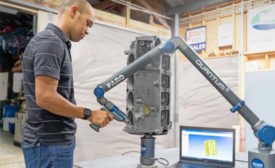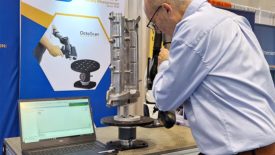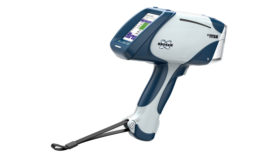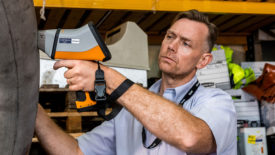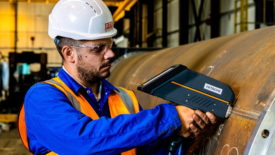Home » Keywords: » quality control
Items Tagged with 'quality control'
ARTICLES
Quality 101
The Next Dimension of Precision: Integrating Rotary Tables into Coordinate Measuring Systems
The accuracy and reliability of CMMs and PCMMs are foundational to quality.
February 16, 2024
Software & Analysis
Quality 4.0: Learning quality control, the evolution of statistical quality control
Learning quality control (LQC) is a process monitoring system based on machine learning and deep learning.
November 22, 2023
NDT | PMI Part 3
Evolution of PMI Technology: Advancements in Handheld XRF Propel Accuracy, Connectivity, and Efficiency
The suite of tools available for PMI has grown.
October 13, 2023
NDT | PMI Part 2
On-Site and Real-Time PMI Testing: Faster Decisions, Enhanced Productivity, and Cost Savings
Learn more about the advantages of positive material identification (PMI) testing.
October 12, 2023
NDT | PMI Part 1
Ensuring Quality and Safety in Manufacturing: The Role of Positive Material Identification
PMI is a vital nondestructive testing method for quality assurance and safety.
October 11, 2023
EVENTS
Webinar
7/27/23 to 7/27/24
Contact: Meg M.
Why Cobots Are the First Choice for Many Small to Medium-Sized Companies
Webinar
9/13/23 to 9/13/24
Contact: Meg M.
How to Reduce First Article Inspection Creation Time by 70-90%
Webinar
10/4/23 to 10/4/24
Contact: Meg M.
Modernizing Quality With Next-Generation Controls and Monitoring Solutions
Webinar
11/8/23 to 11/8/24
Contact: Meg K.
Smart 3D Measurement Planning – It’s Easier Than You Think!
Webinar
3/14/24 to 3/14/25
Contact: Meg K.
The Ride to Excellence: Embracing Digital Twins in Automotive Design, Development & Production
Webinar
3/26/24 to 3/26/25
Contact: Meg K.
AI for Electronics Quality Control: Practical Applications & Case Studies
Webinar
4/3/24 to 4/3/25
Contact: Meg K.
Tilted CT - A New Angle of CT Inspection for Challenging Components
Webinar Sponsored Webinars Sponsored
5/8/24 to 5/8/25
Contact: Meg K.
What You Should Know about Transitioning From Paper to an Enterprise QMS
Webinar Sponsored Webinars Sponsored
5/22/24 to 5/22/25
Contact: Meg K.
Quality Automation: How Robotics and Sensors Play in Quality Control and Production
Get our new eMagazine delivered to your inbox every month.
Stay in the know with Quality’s comprehensive coverage of the manufacturing and metrology industries.
SIGN UP TODAY!Copyright ©2024. All Rights Reserved BNP Media.
Design, CMS, Hosting & Web Development :: ePublishing
